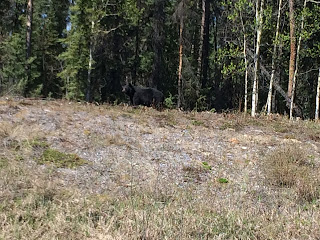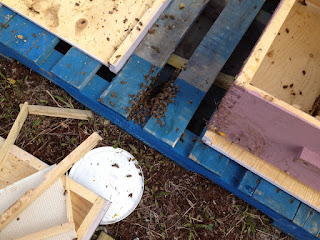Weed Control for Beekeepers
Beekeeping is full
of conundrums, and trying to maintain an all-natural yard without having your
neighbors completely hate you is definitely one of them. I have been
fortunate that no one has complained (yet) about my beautiful crop of
dandelions!
I too, can appreciate a nice yard and
control over the non-flowering, non-nectar producing weeds. At the moment, my
yard has an over-abundance of these less desirable plants. My first plan of
attack was to pull out, by the roots, these non-contributing intruders. But
after the first couple hours, having hardly made a dent, I decided to search
for other options.
 |
| Roundup weed killer |
You don’t have to
look much farther than your local hardware store or garden center to find a
quick and easy solution. I’m sure nobody has missed the negative hype that
surrounds this popular product. Not only is it extremely harmful to honey bees
and other pollinators, it’s been proven to not be too healthy for us either …
but that’s for another blog.
So, what to do? I
had read about a recipe that is ‘guaranteed to kill weeds’. It sounded simple
enough. I thought I’d give it a try and aim for an only-the-weeds-I-want type
yard.
 |
| A fabulous invention! |
I bought a
pressurized sprayer as my yard is too overrun for a handheld spray bottle to do
the trick. This is an absolute must and I can’t believe I have never owned one
before!
 |
The recipe calls for four liters of plain
white vinegar. If vinegar is such an effective weed killer … should I really be
putting it in my beets to make pickles?? Something for future pondering …
Two cups of Epsom
Salt was the next ingredient. Epsom Salt is good for just about everything; why
not weed killing as well!
And finally, a
half cup of ‘blue’ Dawn dish soap. Not sure what’s in this, but it shows up a
lot in ‘deep cleaning’ recipes.
With this
effective recipe, I don’t have to live with unwanted, invasive weeds, nor do I
have to spray with harsh chemicals that hurt/kill pollinators, can make my dog
sick, and are harmful to the environment and me. I can rest assured I’m not
harming the pollinators that visit my yard and the honey bees that live here are
not being poisoned by the very food they eat. (Something we all need to think about.)
This is the hive
in my yard. I checked it yesterday to find a very productive queen bee at work.
The population is still low, but considering the trauma they endured, they’re
doing quite well. You can still see the muddy bear paw print on the bottom box.
 |
| Honey bee hive that survived the bear attack |

















